During the Kings fifth game on October 22, 1967 Flett scored his first NHL goal at 1:10 of the second period, igniting a five goal outburst as the Kings defeated the Chicago Black Hawks 5-3 for a win in their first ever game against one of the established Original 6 clubs.
Seven games later, in a contest held on this date in 1967, Flett became the first member of the Kings to ever score a hat trick when he lit the lamp three times against the Detroit Red Wings at the Olympia. Gordie Howe opened the scoring at 11:59 of the first period only to have Flett counter with his fourth goal of the season at 15:41 from the Kings eventual leading scorer Eddie Joyal and Real Lemieux. After Detroit scored twice during the second period for a 3-1 lead. Flett got his second of the game at 5:17 of the third from Jacques Lemieux and Bob Wall on the power play. Howe responded with his second goal of the game at 5:34 before the Kings erupted with four goals in the span of 6:04 completed with Flett entering the Kings record books at 15:43, again on the power play to complete a 6-4 Los Angeles victory against another Original 6 club.
Flett would go on to score 26 goals and 46 points that season, good for second on the Kings, and would be named the West Division Rookie of the Year. He would play three and a half seasons with Los Angeles, including appearing in the 1971 NHL All-Star Game, until being traded halfway through the 1971-72 season to the Philadelphia Flyers due to his declining offense.
The move to the Flyers paid of for both parties, as Flett played on a line with Bobby Clarke and had his best season as a pro with 43 goals and 74 points in 1972-73.
While his offensive numbers declined the following season to 17 goals and 44 points, the season as a whole was a success, as the Flyers became the first of the expansion clubs to win the Stanley Cup in 1974.
While the Flyers would go back-to-back in 1975, Flett was not there to be a part of it, as he was traded prior to the 1974-75 season to his original rights holders, the Maple Leafs. Flett would play one season in Toronto before being claimed off of waivers by the Atlanta Flames in time for the 1975-76 season, where he would have his fourth 20 goal season to date with 23.
Flett was all set for another season with the Flames, but just four games into the 1976-77 season he was sold to the Edmonton Oilers of the rival WHA. The wide open style of the WHA suited Flett and he quickly reeled off seasons of 34 goals and 54 points in 1976-77, his second 40 goal season of his career with 41 goals and 69 points in 1977-78 and 28 goals and 64 points.
Flett would remain with the Oilers for the 1979-80 season as Edmonton was one of four surviving WHA teams to join the NHL as expansion teams that season. Flett would play just 20 games that season before retiring as a player.
Flett would play 689 NHL games, scoring 202 goals and 417 points and win a Stanley Cup as well as seeing action in 195 WHA games, scoring 103 goals and 187 points.
Today's featured jersey is a 1969-70 Los Angeles Kings Bill "Cowboy" Flett jersey. The Kings original jerseys had single color numbers for their first two seasons before changing their number font and adding white outlines to both their main crest and numbers. These jerseys would remain in use through the 1979-80 season.
Marcel Dionne is the Los Angeles all-time leader in hat tricks with 24 and Flett finished his Kings career with three, the second coming on February 1, 1968 later in the team's first season and the third on December 11, 1968.
Bonus jersey: Today's jersey is a 1976-77 Atlanta Flames Bill "Cowboy" Flett jersey which was also worn by Larry Romanchych following Flett being sold to Edmonton of the WHA. Shortly after Flett was moved to the Oilers, they acquired John Gould from the Vancouver Canucks, who requested the #21 he had worn in Vancouver. Romanchych agreed to relinquish the #21 and changed to the recently vacated #9, previously worn by Flett.
In addition to the fact two different players wore this jersey that season, also of interest is Romanchych's name on the back, as the NHL would not mandate that players wear names on their backs until the following season.
The only time the Flames would wear names on their backs in the 1976-77 season was for nationally televised games. The nameplates were then removed following the games, as many owners felt that having the player's names on the back of the jerseys would harm program sales! This is one of only a small number of Flames jerseys from that season to survive with it's original "TV name" still intact due to teams standard policies of removing them following the televised games.
This practice has led to several unique, and apparently inconsistent, variations of jerseys for several clubs, as many did not believe teams had ever worn particular styles in combination with names on the back, such as the Cleveland Barons wearing names on jerseys with their one-year-only state of Ohio sleeve patches, known to have been from their "nameless" first season in Cleveland, until knowledgeable collectors recalled the practice of names being added just for national TV games on the weekends. They were somehow able to document the TV schedules from back then and verify their explanation of jerseys with names that should not normally have them from game photos with their opponents from those dates appearing in the background to collaborate their theory in a fascinating bit of research.
The Flames would wear the same jerseys for their entire run in Atlanta from 1972-73 through 1979-80 with only minor striping tweaks after their first season and the addition of league mandated names on the back in 1977-78.
Today's first video is footage from the Kings victory over Chicago on October 22, 1967 which amazingly includes Flett's first NHL goal. What a find! Note the old scoreboard at the Chicago Stadium with clock faces.
Flett and the Flyers winning their first Stanley Cup in 1974.

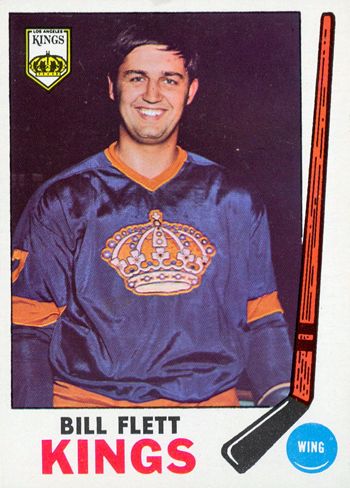
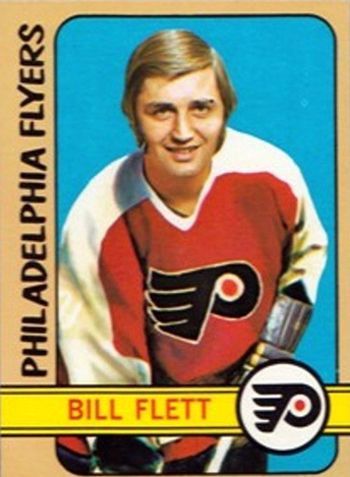
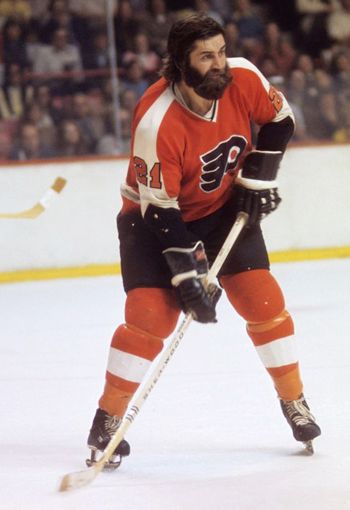
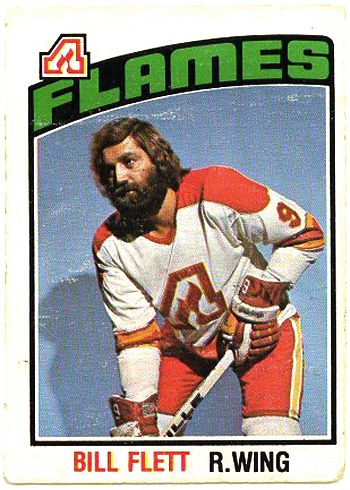
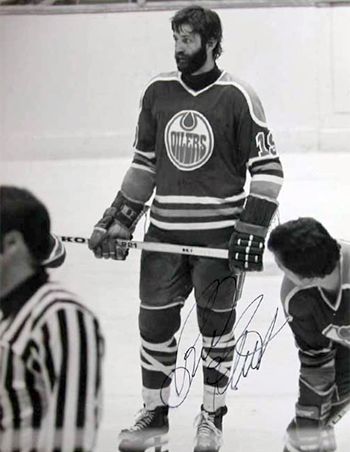
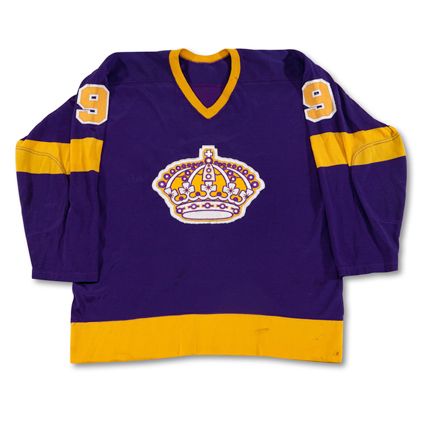
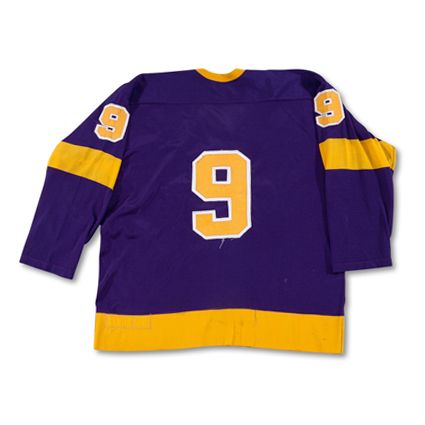
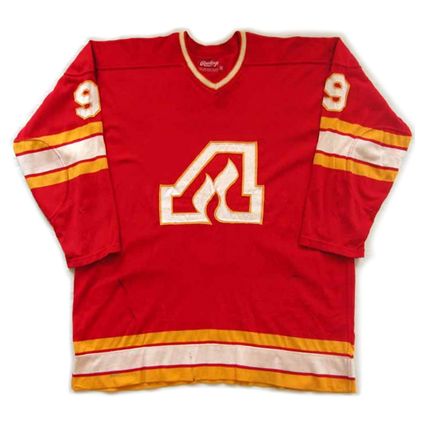
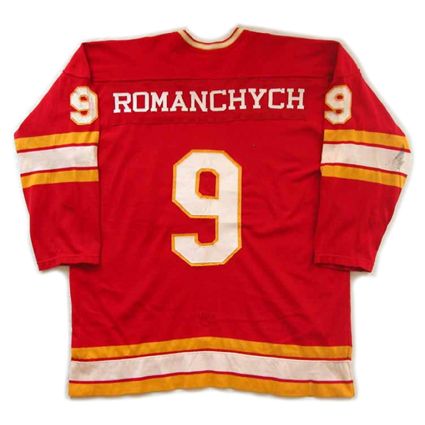










No comments:
Post a Comment
We welcome and encourage genuine comments and corrections from our readers. Please no spam. It will not be approved and never seen.